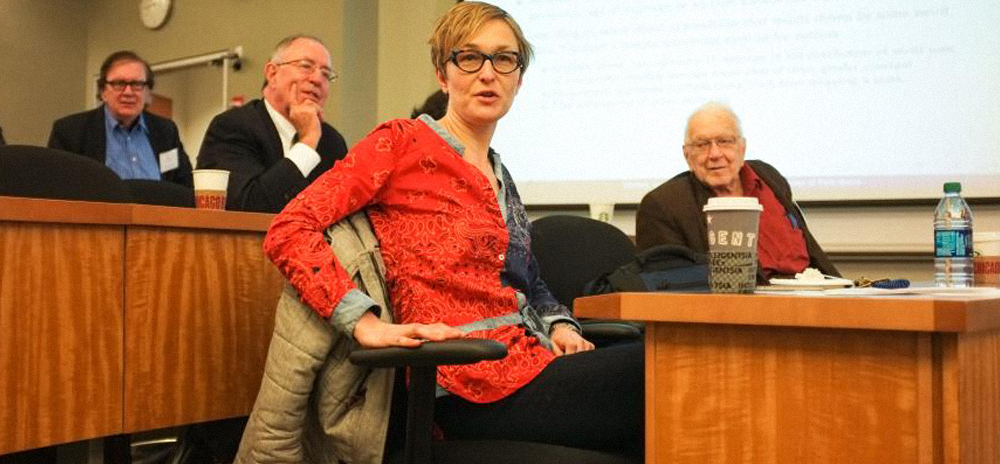
Poverty Lab director Marianne Bertrand is the Chris P. Dialynas Distinguished Service Professor of Economics at Chicago Booth. (Photo courtesy Urban Labs)
UChicago launches Urban Labs, an all-in, evidence-based effort to improve urban life.
“With large concentrations of people come magnified challenges. How do we ensure a good education for all of our young people? How can we be sure those students will graduate into decent jobs? How do we provide families with good housing, with a reliable and sustainable energy supply, in a safe neighborhood? How do we make certain that lives are not cut short by violence, pollution, and poor health? In short, how can we make cities work better?”
Those questions, posed by University of Chicago president Robert J. Zimmer, echoed through the Chicago Cultural Center’s Grand Army of the Republic Rotunda on March 9, shortly before he announced an expanded University initiative to help find the answers: the UChicago Urban Labs.
Funded in part by a $10 million gift from the Pritzker Foundation, Urban Labs will take a data-driven approach to tackling cities’ long-term challenges, partnering with policy makers and community leaders to design, pilot, test, and implement workable programs and policies.
The network of five Urban Labs builds on the successes of the UChicago Crime Lab, created in 2008, and the Urban Education Lab (2011). For example, during the 2009–10 school year, a mentoring, counseling, and sports program called Becoming a Man, developed by two Chicago nonprofits, sought to strengthen impulse control, personal responsibility, aspirations for the future, and other social-cognitive skills in adolescents. The Crime Lab’s pilot study of the program’s Sport Edition, structured as a randomized clinical trial, found significant improvement in high school performance and reduction of arrests among the 800 students who participated. Today, Becoming a Man is reaching more than 2,000 students with a goal of expanding to 3,800 students in the 2015–16 school year.
Similarly, an early study found that a mathematics tutoring program that is intensive, individualized, and cost effective compared to other interventions improved math learning for high-risk adolescent boys by up to two years after 12 months in the program. The Urban Education Lab is undertaking a large-scale trial of the program in Chicago, even as it is launched nationwide.
The expanded Urban Labs include three new labs, focusing on urban poverty; health; and energy and the environment. A UChicago faculty member heads each. Marianne Bertrand, the Chris P. Dialynas Distinguished Service Professor of Economics in the University of Chicago Booth School of Business and faculty codirector of the Social Enterprise Initiative, who is already working with the City of Chicago to design and evaluate new jobs programs, has been named director of the Poverty Lab. David Meltzer, LAB’82, AM’87, PhD’92, MD’93, professor in the Department of Medicine, chief of the Section of Hospital Medicine, and director of the Center for Health and the Social Sciences, leads the Health Lab (see “Rx: Research”); and the Energy and Environment Lab is led by Michael Greenstone, LAB’87, the Milton Friedman Professor in Economics and the College and director of the Energy Policy Institute at Chicago (see “Particulate Matters”).
Jens Ludwig, the McCormick Foundation Professor in the School of Social Service Administration, Law School, and University of Chicago Harris School of Public Policy, continues to direct the Crime Lab while codirecting the Urban Education Lab.
The Urban Labs are led by inaugural Pritzker director Timothy Knowles, who is also the John Dewey Clinical Professor in the Committee on Education and codirector of the Urban Education Lab with Ludwig.
The labs’ directors, Zimmer explained, “will work in their own areas of expertise, but because these problems are complex and interrelated, they will also work together at the intersection of issues like health, education, and jobs.”
Speaking at the March 9 event, US secretary for housing and urban development Julián Castro underscored why work like that of the Urban Labs is so essential, not just for Chicago, but for the country as a whole. Fifty years after Lyndon Johnson created the Department of Housing and Urban Development, Castro said, “our resources simply haven’t kept up with the needs of those we serve.” So evidence-based practices help ensure “that we’re investing in what’s working and making adjustments where we see that something’s not.”
To generate evidence on ideas and programs that work, the University is seeking proposals from community groups, nonprofits, and government agencies through the Urban Labs Innovation Challenge, funded by the Pritzker gift. Letters of interest due this spring will be narrowed down over the summer by an advisory committee of civic leaders and academic experts. A small group of applicants will then be invited to submit proposals. The inaugural round of Innovation Challenge recipients will be announced in September. One or more winning programs, which could receive up to $1 million over the course of two years, will be evaluated with a randomized controlled trial or a similarly rigorous evaluation. Proposals for the first competition must be ideas that can be enacted in Chicago.
The hope, said Ludwig, is that “in five or 10 years, Urban Labs together have identified a collection of promising policy solutions that can improve millions of people’s lives around the world.”
